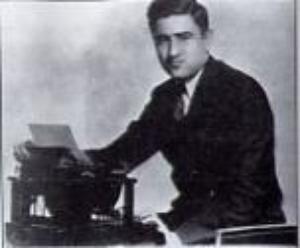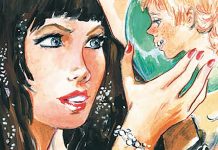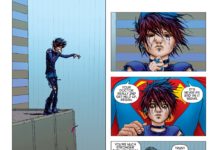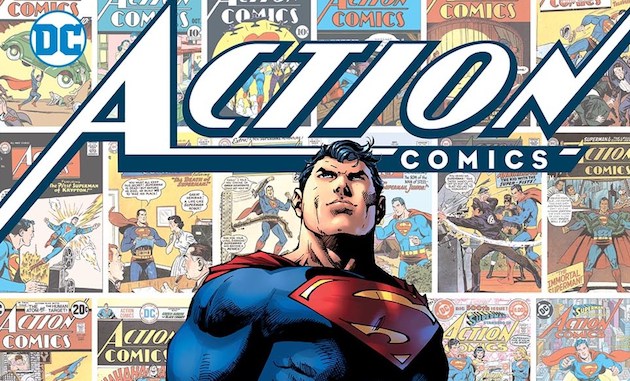Over the past year creators’ copyright crusader Marc Toberoff took some serious hits in the various Superman and Kirby lawsuits. Yet there was also a deceptively routine procedural matter that could have already assured him a victory in the Siegel estate’s Superman appeal.As we’ve seen multiple times over the past decade, judges can be as important as precedents and statutes. Give Bill Clinton one more Supreme Court appointment and George W. Bush would not have been president. Replace Chief Justice Roberts with a more hard-line conservative and Obamacare would be dead.
The same goes for lower courts, from local township judges to federal circuit courts of appeal. An experienced litigator will pay just as much attention to the who is making the decision as the letter of the law.
At the federal appellate level, the composition of the three judge panel deciding your case is typically a matter of chance. Court administrators pick judges at random to serve on panels at scheduled court dates, and as oral arguments draw near a panel gets assigned to particular cases. In some instances, though, a returning case may go to a panel that previously heard it, and a newer appeal could be consolidated with a related case already in progress.
Along with the judges you also might want to factor in whoever is clerking for them at particular time. Clerks are recent graduates who assist the judges in preparing cases and in some instances help draft opinions. For instance, if the case had been around somewhat earlier, there might have been an aspiring corporate counsel or even someone quite familiar with the case, such as, well, me.
The Siegel Appellate Panel
If you’re Toberoff, the panel draw in the Siegel case is rather encouraging.
- Judge Stephen Reinhardt is a stalwart liberal whom one might expect to be sympathetic with a downtrodden creator’s family battling a multinational corporation–hence DC’s doubling down on the Siegel family’s gains under the earlier settlement terms and the portrayal of Toberoff as a corporate carpetbagger in disguise.
- Judge Sidney Thomas — a moderate-to-liberal jurist on President Obama’s shortlist for the Supreme Court – also has a strong reputation for being compassionate toward the powerless. Equally interesting, he wrote the opinion in the Ninth Circuit’s controversial 2005 Grokster ruling, which found in favor of file-sharing against corporate IP interests. (That ruling was subsequently overturned by the Supreme Court.)
- Judge John Sedwick is a Bush I appointee with some intriguing moderate decisions. There are also indications that he might be reluctant to shut down the Siegel case without a trial solely on the filings as to the heirs’ alleged agreement with an earlier term sheet–though that could equally work against the Siegels, given DC’s request for a trial on the settlement question.
Because the same panel is hearing the appeal of anti-Slapp portion of the Pacific Pictures case, one also has to consider the likelihood of an outcome favorable to Toberoff in that appeal as well. In fact, the evident sensibility of the Reinhardt/Thomas/Sedwick panel seems to have triggered the spider-sense of DC’s attorneys, who tried without success to get the case transferred to the more conservative panel that issued a sharp ruling against Toberoff in a different aspect of the Pacific Pictures dispute.
Of course, even with their particular personal inclinations the judges now considering these cases could end up ruling for DC–as I’ve noted in my posts pretty much from the outset, a savvy lawyer or judge could find substantial grounds for reaching a far different decision than the landmark 2008 Siegel victory, which arguably relied on some rather creative judicial reasoning.
The upshot of all this? Whatever one’s sense of the law and fundamental principles at stake in the Siegel case, the outcome is not simply a rote function of applying clear law to clear facts. Legal ambiguities, procedural technicalities, ethical strictures, judicial perspectives–these are just a few of the key factors that could shape what happens next.








“Give Bill Clinton one more Supreme Court appointment and George W. Bush would not have been president.”
I think you mean Al Gore.
No he is right. Clinton would have needed to have nominated a Justice to the court before the election cycle that had Bush versus Gore. He was the president preceding that election so a more left leaning Justice would have come from Clinton not Gore.
Why was Judge Larson’s judicial reasoning “creative” as opposed to Judge McMahon’s? I don’t recall anything as plain weird as McMahon parroting Stan Lee’s irrelevant transgressions about the Hulk being the first green super hero in Larson’s ruling. Of course Larson did leave (retired) to become an IP attorney, but I find it discouraging that in the U.S. opinions which do not confirm to corporate interests are viewed as creative. It’s true anything that goes against corporate reasoning is highly unusual, but that’s a very sad thing. If Larson’s ruling was creative, then we need a whole lot more judicial creativity. I saw his reasoning as truly “fair and balanced.”
BTW: Larson sounds like he would have conservative leanings based on his profile. He is currently representing Fleisher Studios in a lawsuit involving the character Betty Boop.
http://en.wikipedia.org/wiki/Stephen_G._Larson
Further background: http://www.metnews.com/articles/2009/lars092809.htm
Patrick, a few thoughts:
The Kirby ruling was actually straightforward and predictable in the context of 2nd Circuit IP jurisprudence. That’s why Toberoff tried to have the case moved to CA. The Ninth Circuit has a reputation for issuing creative progressive decisions, which contributes to its being the most reversed circuit in recent years. The Second Circuit has a business friendly reputation.
One key example of Larson’s creativity: finding that the DC’s ownership of the black and white Superman in the Action house ads didn’t give the company any rights in Superman. At the same time, he gave Siegel and Shuster full rights in the colorized interior pages and the colorized hero on the cover, despite work-for-hire coloring by DC staff. Larson had an outcome he wanted to reach and did whatever necessary to get there, even if the parts didn’t quite fit together.
Re Larson’s conservatism — there’s much more to him (and conservative appointees) than cut-and-paste corporatism. One could even argue that helping Fleischer re Boop has a different valence from helping Time Warner.
Jeff, Sure there is no doubt two of the reasons Disney broke off settlement talks and filed a lawsuit against the Kirby heirs was to get the court of their choice, as well as the fact they didn’t want the termination notices hanging over their heads until the heirs could act on them (2014 if I recall).
Judge McMahon was rather creative herself in reaching the conclusion she wanted. She excluded the expert testimony of Mark Evanier and John Morrow reasoning they were not at Atlas/Marvel during the years in question (1958-1963), but she allowed the testimony of Roy Thomas, and John Romita who told Toberoff during their depositions they had no first hand knowledge of anything which went on at Marvel 1958-1963. She also accepted very single thing Stan Lee said as factual, and clearly stated “Marvel’s case stands or falls on his (Lee’s) testimony.” In the same ruling she discounted the testimony of the Kirby heirs as, “the recollections of children.” This is in spite of the fact Susan Kirby was 16 years old in 1961, and Neal Kirby was 13 at the time.
Wasn’t Larson’s ruling on what portions of the Superman character and myth the Siegel heirs were awarded based on things created on spec before the character was sold to DC? The application to the published comic book was based on those elements created previously on spec.
I think the same principle was the basis of the Kirby’s heirs copyright termination notifications. The argument was Kirby created a character on spec (Spiderman, Mister Miracle, a set of Norse gods) and offered them to Marvel. If Marvel rejected a character Kirby was free to sell it later to DC or Topps, and if they accepted the character the copyright claim to THE CHARACTER would be attached to the published comic book. In the Siegel case Action #1, in the Disney vs heirs case a long list of Marvel first issues, and issues where characters first appeared.
Obviously people do not fit a universal mold, but Larson is clearly a conservative. He was appointed by George W. Bush.
>> McMahon parroting Stan Lee’s irrelevant transgressions about the Hulk being the first green super hero >>
Huh?
The Hulk wasn’t the first green superhero.
Heck, the Hulk wasn’t even the first green Marvel superhero.
kdb
Hmm. Come to think of it, the Hulk wasn’t even the first green Marvel superhero co-created by Jack Kirby.
Lee mentioned the Hulk being the only green super hero around at that time in his deposition testimony for Disney attorney James Quinn. I assume Lee didn’t follow DC comics? Here is where the bulk of the Disney/Marvel related Stan Lee testimony and supporting documentation. Keep in mind almost all of what Toberoff produced remains under seal, including all but a few pages of his 400 page deposition of Lee conducted in Dec. 2010. All the attachments can be viewed by selecting the correct links.
http://docs.justia.com/cases/federal/district-courts/new-york/nysdce/1:2010cv00141/356975/65/
So if you go to attachment #1 Exhibit 1 you find EXCERPTS from Quinn’s deposition of Lee.
http://docs.justia.com/cases/federal/district-courts/new-york/nysdce/1:2010cv00141/356975/65/1.html
Lee’s discussion of the HULK begins on Exhibit page 64 (page 80 of the unredacted transcript ).
Lee says he looked around for a color that wasn’t being used and couldn’t think of a green hero.
In her summary judgment ruling on page 18 McMahon wrote:
“By the second issue The Hulk had acquired his now-recognizable green skin. (Lee Dep. 81:20-83:4.) Lee picked the color green because there was no other green hero at the time. (Id.)”
Lee also claims in the deposition he conceived the Hulk as a sympathetic monster like Frankenstein. This matches what Lee wrote in his 1974 ORIGINS OF MARVEL COMICS book.
Here’s Kirby in early 1969 (a year before he stopped selling his freelance creative work to Marvel)) being interviewed by Mark Herbert.
Kirby: “I created the Hulk, and saw him as kind of a handsome Frankenstein. I never felt that the Hulk was a monster, because I felt the Hulk was me.”
Stan Lee disputed Kirby’s interview statements (with Mark Herbert 1969) saying Kirby had read Lee’s ORIGIN OF MARVEL COMICS (published in 1974).
Stan Lee: I wrote the Origins of the comics for Marvel I think I even put it in my
introduction, and he read that. He didn’t say anything then. But
with the Hulk I wanted something that was a combination of the
Frankenstein Monster and Jekyll and Hyde, and I’ve said that to people
over and over again. And I read an interview with him somewhere, and
he said, ³I’ve always liked Frankenstein and Jekyll and Hyde, and I
wanted to do it.² And the son-of-a-bitch read that I had written it
and it somehow became part of his–you know, how d’ya–
BTW. I don’t think it’s unusual Lee mentioned the green Hulk story during the friendly deposition he gave for Disney. That deposition is almost like reading the typical Stan Lee interview he’s given for the past forty years. James Quinn simply gives Lee the framework to tell the same stories Lee has told dozens of times before. The Dec. 2010 deposition of Lee by Toberoff would no doubt be really amazing to see, but just about every last bit of it is under a protective order requested by Disney.
What I find odd is Judge McMahon chose to quote the “green Hulk” story in what was a pretty brief (51 pages) ruling on a very complex set of discovery materials. A good percentage of her ruling is comprised of quotes from Lee’s deposition for Disney. This makes sense because she said the case “Stands or falls based on his (Lee’s) testimony.”
I tend to avoid Lee interviews and didn’t read what was available from his testimony, since I figured every time I do I lose a little more respect for him, and I don’t have much left to lose.
I think after those bits quoted above, I’m done. Lee’s an empty suit as far as I’m concerned.
Re the Stan Lee testimony, the judge was just applying standard evidentiary principles re summary judgment, hearsay and credibility. One’s mileage may differ in other contexts, but the judge was concerned solely with the legal procedure for deciding a case.
A couple relevant quotes from the McMahon Kirby ruling:
“Broad, conclusory attacks on the credibility of a witness will not, by themselves, present questions of material fact.” Island Software & Computer Serv., Inc. v. Microsoft Corp., 413 F.3d 257, 261-62 (2d Cir. 2005) (citing Crawford-El v. Britton, 523 U.S. 574, 600 (1998)). Defendants challenge the credibility of Stan Lee, who (not surprisingly, given his significant role at Marvel during the relevant time period) is Marvel’s main witness. However, general attacks on Lee’s honesty or credibility, without more, are insufficient to raise a genuine issue of fact, see, e.g., Crawford-El v. Britton, 523 U.S. at 600; McCullough v. Wyandanch Union Free Sch. Dist., 187 F.3d 272, 280 (2d Cir. 1999)–especially since many matters about which Lee testified are corroborated by testimony from other freelance artists and writers.
…
Even if the Court were to consider the “expert” testimony of Evanier and Morrow, the result would remain the same: neither Evanier’s nor Morrow’s testimony creates an issue of fact as to whether the Kirby Works were created at Marvel’s instance and expense. As discussed, the fact that Marvel paid Kirby a fixed per-page rate for those works is by itself sufficient to satisfy the expense prong. Moreover, the testimony of witnesses with first-hand knowledge, such as the testimony of Lee and Lieber, establishes that the Marvel works were created at Marvel’s instance. Evanier’s and Morrow’s testimony, based on hearsay and lacking in personal knowledge, is insufficient to create an issue of fact on the “instance” prong. Because neither “expert” points to “an agreement to the contrary,” their testimony is also insufficient to rebut the presumption that the Kirby Works were works made for hire.
Larry Lieber by his own admission has no firsthand knowledge of anything concerning the way Kirby worked 1958-1963 with the exception of seeing Kirby leave Lee’s office and rip a completed Hulk story in half tossing it in a trash can as he walked past Lieber.
In fact no one except Kirby, Sol Brodsky, and Lee would know anything about the Lee/Kirby meetings 1958-1963 except Kirby, Brodsky, and Lee, because there was no one else there.
As I said the judge did allow the testimony of Romita and Thomas who were not present during the years 1958-1963, and they told Toberoff they knew absolutely nothing about what went on during those years. Toberoff points out all through the Thomas deposition that Thomas did not have any firsthand knowledge of what went on at Atlas/Marvel during the 1958-1963 time period in question.
MR. TOBEROFF:: — after July 1965; is that correct?
ROY THOMAS:: I always meant it to be.
MS. KLEINICK: You made the standing objection.
MR. TOBEROFF:: I understand, but I don’t want the record to look like he’s talking about the early 1960s when he wasn’t there.
MS. KLEINICK: You made your objection.
ROY THOMAS:: I understand it as being from ’64 on, because I wouldn’t know anything about an earlier period.
The fact is Thomas and Romita have almost no personal knowledge of the way Kirby worked even after they were working for Marvel. Thomas sat in on only the one staged “story conference” which involved a New York Herald-Tribune reporter. Thomas said in TJKC #18 he had no idea why he was invited to sit in, he did not take notes, had never sat in with Lee and Kirby before, had no idea why he was there, or for what purpose, and never witnesses a Lee/Kirby story conference again. Kirby thought the Herald-Tribune interview was an act, a staged show put on by Lee which had nothing to do with their usual meetings.
Romita never participated in any meetings between Lee and Kirby with the exception of a single incident where he was in a car with Lee and Kirby and they seemed to be ignoring each others suggestions.
If you go and read Evanier’s deposition as well as the deposition of John Morrow it’s obvious both of them go to absurd lengths to NOT attack Lee’s credibility. Evanier says he just doesn’t understand Lee’s deposition testimony based on prior conversations with Lee, as well as Brodsky and Kirby.
The larger issue is the judge ignoring the testimony of the Kirby heirs. They gave detailed eyewitness testimony that their father created characters on spec and offered them to Marvel. A few people in various places have tried to make a big issue out of the fact that Neal Kirby said in passing that his father never worked on spec. This was clarified very quickly and it was apparent Neal Kirby felt working “on spec” meant his father created complete stories and then offered them for sale, as opposed to character pitches. People eager to find some imagined “slam dunk” moment amplified the “my dad didn’t work on spec” comment, while ignoring the follow up questions which painted a completely different picture. The whole of Neal Kirby’s deposition makes it absolutely clear his father was creating characters at home, and then offering them to Marvel.
If only three people were there, and two are dead, and one is able to testify, that person will win. Everything Lee testified to he had first hand knowledge of. Everything from Evanier is hearsay, period. That is why Disney won. It’s basic summary judgment standards/rules of evidence. You’re not an expert because you talked to Jack Kirby or worked with him ten years after the fact. Judge McMahon’s decision was straightforward and the only one legally possible. There was no evidence provided that countered Lee’s testimony-just speculation, innuendo, and hearsay-legally insufficient. Far from a creative decision. it was a very dry by the numbers simple decision to get to the legally proper result. If Kirby were alive, or his heirs had evidence for their position, summary judgment would be denied. But he isn’t and they didn’t. Disney benefitted because Lee has continued to live.
Neal Kirby, etc’s testimony does not create an issue of fact either. “I saw my dad create characters at home” -general testimony about general characters with no firsthand knowledge of whether Marvel bought any of these characters or whether or not he met with Lee etc and was given the assignment.
Lee: i conceived of Spider-man/Hulk/FF and then brought to Kirby. Specific. To the point. On the issue at hand.
Legally, there’s no issue of fact. The heirs testimony is not specific evidence that contradicts Lee’s testimony at all. Had Neal Kirby been at any meetings with lee/kirby and had Neal known exactly what characters Kirby created on his own without any prodding and then brought to Marvel, issue of fact.
But he wasn’t and he didn’t.
Comments are closed.